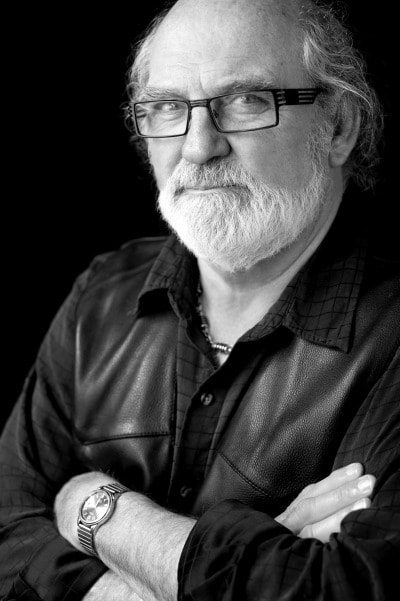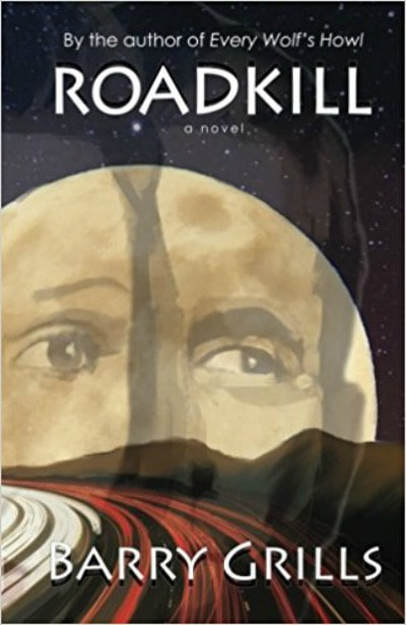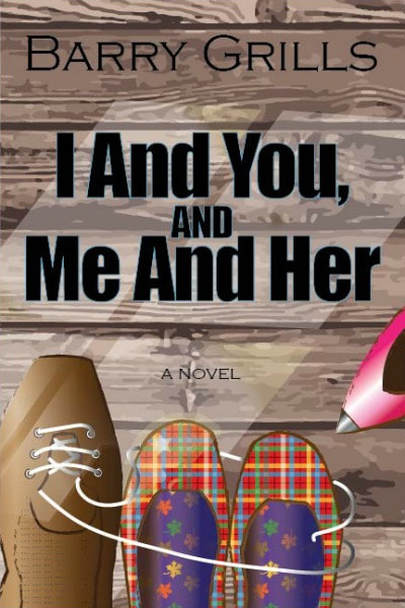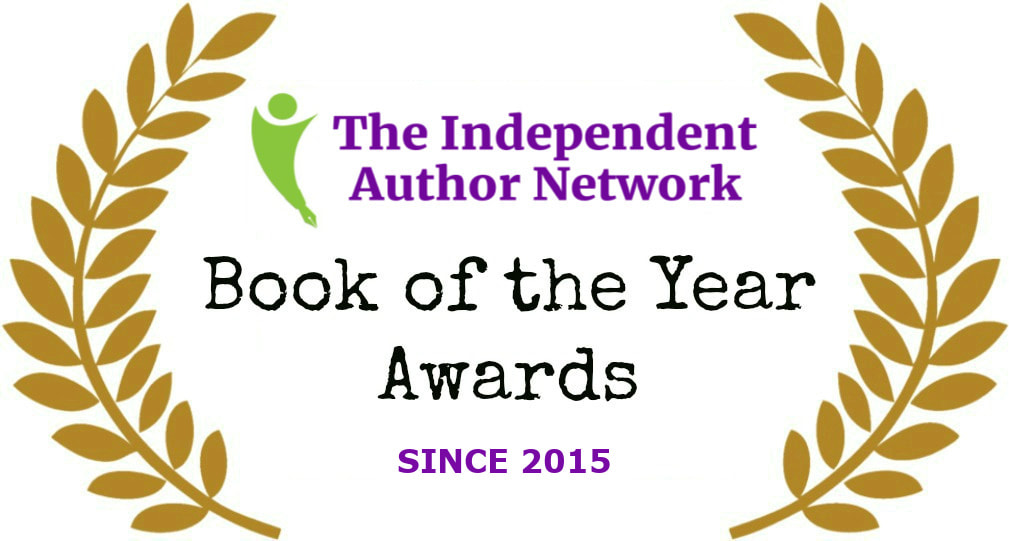Barry Grills
|
Former journalist, broadcaster, municipal councillor and federal election candidate, Barry Grills was born in Belleville, Ontario. He has been publishing short fiction in Canada since 1973. Short stories appeared in various literary magazines such as Quarry, Grain, and the University of Windsor Review, as well as anthologies, including Best Canadian Stories. He is also the author of three cultural biographies from Quarry Press on the lives of Anne Murray, Alanis Morissette and Celine Dion. An updated biography of Celine Dion with Jim Brown was the source of a CBC Television movie which aired in 2008. Every Wolf's Howl: A Memoir, about his adventures, friendship, and spiritual transformation with a wolf-German shepherd cross companion, was published by Freehand Books in autumn 2012. His most recent publications include the dystopic novel, Roadkill, a finalist in competitions in both the Indie Book Awards and the Whistler Independent Book Awards, and a romantic manifesto called I And You, And Me And Her.
He is a past chair of The Writers’ Union of Canada and the Book and Periodical Council. He is married to writer and community college professor, Jennifer Rouse Barbeau. They live in North Bay, Ontario. |
Roadkill
|
Science Fiction
Roadkill is a dystopian novel set in the future. Written about the triumph of the human spirit, about defying incredible odds and the blooming of love across barriers of culture, economics and traditional experience, the novel is one part social commentary and one part futuristic adventure story. It traces the story of Mary, a history professor at “The Company” university, who wishes to escape the stifling autocratic regime in which she lives and works. The novel also tells the story of Keats, a Bonded worker who, under the accidental influence of a sense-expanding drug called existentialene, flees the work camp where he lives, into a mysterious region at the edge of his city, known as The Open Space. Encountering one another unexpectedly in this mysterious and uncharted setting, Mary and Keats form an uneasy alliance as they flee deeper into what they soon discover is a large museum of fabricated eco-regions – a jungle, a desert, to name but a few – pursued by The Company’s security forces, known as Calvins. Roadkill is a chilling speculation about a world in the not-too-distant future where religion, history and all aspects of human life are manipulated by The Company: a sprawling corporate empire of interconnected factory branches and work camps. The novel derives its title from the fate of those who would try to cross the 1,000-mile Liberty Freeway oval that serves as an impenetrable barrier around the Open Space, the Company’s various divisions, its work camps, and the ghostly city where where management and security forces live. Thousands of wheelmen drive high-speed vehicles called rodancers around this high speed oval, preventing bonded workers from surviving any dash across the pavement in a quest for the potentially different world beyond. But Roadkill is also an unusual love story. From disparate backgrounds and circumstances, Mary (the Golden Woman) and Keats (the Orphan) come together in friendship and, ultimately, in love, as they penetrate more deeply into the artificial, exotic and sometimes dangerous world of the Company museum that makes up the Open Space. Then, in the climactic moment when they must conquer the barrier of the freeway, in search of freedom, Mary and Keats join forces with a natural environment that also refuses to be conquered by The Company. In alliance with the natural world itself, Mary and Keats escape the oval in which they have been trapped, demonstrating the perpetuity, triumph and resilience of the human spirit. |
I And You, And Me And Her
|
Literary Fiction/General
Tom McNamara has a secret. For more than twenty years he has been deeply in love with his sister-in-law, Jan. For more than twenty years, Tom and Jan have kept silent about a passionate three-day love affair they shared during a skiing trip in Europe. While neither of the lovers was married at the time – Jan was engaged in Toronto and Tom believed he would marry Judy, a woman he had been seeing for a few months in Ottawa – Jan and Tom decided to part permanently. Convinced their love was too perfect to last, and too impractical to survive in a world devoted to more conventional approaches to relationships, Tom and Jan said goodbye and left Austria to return to their partners in Canada, anticipating they would never see one another again. But destiny can be perfidious, Tom has discovered. A few days before his wedding he encounters his “perfect” lover again, stunned to realize she is actually his fiancee’s sister. Compelled to go ahead with the wedding, Tom discovers his passion for Jan simply will not wane, regardless of his marital status. Condemned to suffer from unrequited love, Tom joins Jan in concealing (even from one another) what happened to them in Austria. Was the love he felt during those three mystical days some kind of unfortunate aberration? If so, as time passes, why won’t it go away? Now, twenty years later – six months after the death of Judy and Jan’s disapproving mother Gladys – Tom, Judy, Greg and Jan are going to spend an October weekend at a rundown lodge near Temagami, a piece of property that has shown up unexpectedly as part of Gladys’s estate. Once they arrive, they intend to assess its worth so that they can sell it. After all, Jan’s husband Greg is a real estate whiz in Toronto and Greg shares Judy’s dismay over the disappointing financial worth of the rest of Gladys’s debt-ridden estate in Rosedale. The weekend in Temagami is tense from the beginning. Judy is furious with her deceased mother over the secrecy and inconvenience surrounding the lodge. She fears Tom is growing to like the place due to his affinity for the wilderness and his increasing restlessness with the Ottawa suburbs where they live. For his part, Tom is preoccupied with uncovering the mysterious reasons his snooty mother-in-law ended up owning a Northern Ontario lodge no one knew about. Worse yet, he still loves Jan desperately and wants to confess his feelings, so that at last he can truly find himself and get on with a life he feels should be more authentic. Written with a hyperbolic sense of humour, the chapters in I And You, And Me And Her alternate between the present day at the lodge in Temagami and the incidents before and after the Alps, when Tom met his perfect lover and then, apparently acquiescing to her wishes, married her sister instead. The novel examines the dynamics of romantic love, both conventional and unconventional, skewering along the way the myths society constructs around its relationships. In the end, though, I And You, And Me And Her is about finding the courage and self-awareness to be the person you really are. |
Oblivion
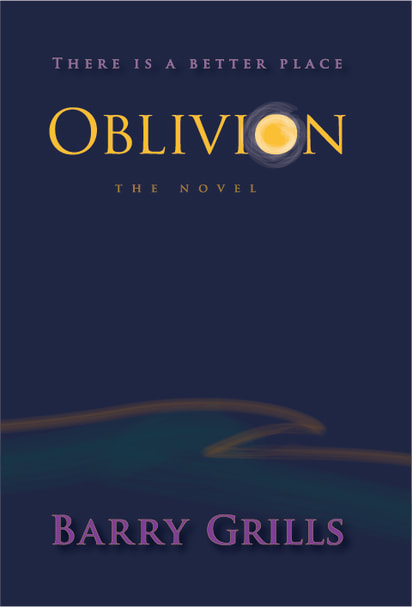
speculative, literary fiction
Richard Braddock is a successful man. He earns a six-digit annual salary from Cascade Enterprises, a large multi-national corporation. He lives comfortably in the suburb s of a large Canadian city with his wife, Alex, and their three teenage children.
One day, on his way to the Starbucks that leases space in the huge city block skyscraper that is Cascade Enterprises, Richard discovers that the homeless panhandler he has been ignoring for months is Derek Cavanaugh, his former best man and friend, a lawyer who has fallen on hard times. Although the two men have been out of touch for about two decades, Richard is appalled by Derek's circumstances and wants to help him get back on his feet. But Derek isn't interested in being rescued. Nonetheless the two men manage to rekindle the friendship they once enjoyed.
But things are going badly for Richard too. For one thing, a mysterious rash on his neck and upper back defies medical intervention. For another, Richard's home life is sadly chaotic. Two of his three children have no empathy for him. His wife is repelled by the sores on his neck and hasn't had sex with him for months, and Richard even wonders if she is having an affair. To make his situation even worse, Richard's boss, Amanda Drew, has no sympathy at all for his allergy and wants him to regain his "pleasant good looks" as soon as possible. Or else.
Increasingly, though, Richard is distracted by something other than the issues in his home and working life. He begins to "zone out," as he sees it, visiting a world much different than his own, a utopia of calm and plenty that represents a stark contrast to the more chaotic world in which he lives. While the aftermath of these "visits" leaves him with a temporary, wonderful sense of calm and well-being, he doesn't remember the tranquil place he visits, even though a new life in Oblivion has begun to take shape for him. The only clue to what might be happening to him resides in a four-word mantra that Richard keeps hearing in his mind, like a musical earworm: everything just lives here. And then, to his dismay, he discovers his son, Kevin, the child he is closest to, is hearing the same mantra and has mentioned it on Facebook.
Written in three chapters – Then, Now, and Later – Oblivion tells the story of one man’s gradual arrival in the place where people are no longer remembered by conventional society. Oblivion, we discover, is the place where the forgotten go to live out their lives in a much different fashion than we do. As Richard soon discovers, his friend, Derek, the man on the corner panhandling for funds, may hold the key to Richard’s ultimate choice of where to spend his life.
Gradually, in imaginative and sometimes humorous ways, Richard’s two contrasting worlds collide, moving him closer to the decision many of us face as we seek to be authentic in our lives.
Oblivion was completed with the financial assistance of the Ontario Arts Council and the Canada Council, both of which awarded grants to fund the writing of the project.
Richard Braddock is a successful man. He earns a six-digit annual salary from Cascade Enterprises, a large multi-national corporation. He lives comfortably in the suburb s of a large Canadian city with his wife, Alex, and their three teenage children.
One day, on his way to the Starbucks that leases space in the huge city block skyscraper that is Cascade Enterprises, Richard discovers that the homeless panhandler he has been ignoring for months is Derek Cavanaugh, his former best man and friend, a lawyer who has fallen on hard times. Although the two men have been out of touch for about two decades, Richard is appalled by Derek's circumstances and wants to help him get back on his feet. But Derek isn't interested in being rescued. Nonetheless the two men manage to rekindle the friendship they once enjoyed.
But things are going badly for Richard too. For one thing, a mysterious rash on his neck and upper back defies medical intervention. For another, Richard's home life is sadly chaotic. Two of his three children have no empathy for him. His wife is repelled by the sores on his neck and hasn't had sex with him for months, and Richard even wonders if she is having an affair. To make his situation even worse, Richard's boss, Amanda Drew, has no sympathy at all for his allergy and wants him to regain his "pleasant good looks" as soon as possible. Or else.
Increasingly, though, Richard is distracted by something other than the issues in his home and working life. He begins to "zone out," as he sees it, visiting a world much different than his own, a utopia of calm and plenty that represents a stark contrast to the more chaotic world in which he lives. While the aftermath of these "visits" leaves him with a temporary, wonderful sense of calm and well-being, he doesn't remember the tranquil place he visits, even though a new life in Oblivion has begun to take shape for him. The only clue to what might be happening to him resides in a four-word mantra that Richard keeps hearing in his mind, like a musical earworm: everything just lives here. And then, to his dismay, he discovers his son, Kevin, the child he is closest to, is hearing the same mantra and has mentioned it on Facebook.
Written in three chapters – Then, Now, and Later – Oblivion tells the story of one man’s gradual arrival in the place where people are no longer remembered by conventional society. Oblivion, we discover, is the place where the forgotten go to live out their lives in a much different fashion than we do. As Richard soon discovers, his friend, Derek, the man on the corner panhandling for funds, may hold the key to Richard’s ultimate choice of where to spend his life.
Gradually, in imaginative and sometimes humorous ways, Richard’s two contrasting worlds collide, moving him closer to the decision many of us face as we seek to be authentic in our lives.
Oblivion was completed with the financial assistance of the Ontario Arts Council and the Canada Council, both of which awarded grants to fund the writing of the project.

